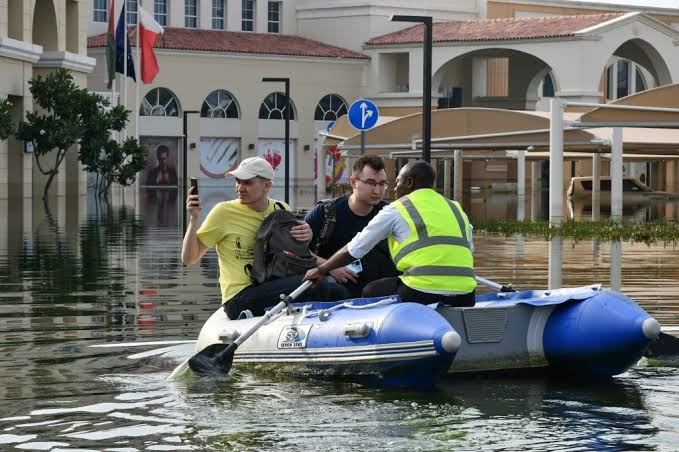Historic floods in UAE, Oman linked to climate change, Scientists Say

A recent report by a group of international scientists suggests that the devastating floods that struck the United Arab Emirates (UAE) and Oman last week are “most likely” linked to climate change caused by fossil fuel emissions. The World Weather Attribution (WWA) group, which investigates the role of climate change in extreme weather events, concluded that global warming has likely contributed to the unprecedented rainfall that caused significant loss of life and widespread damage.
The WWA study indicates that extreme rainfall in the region has become 10-40 percent heavier during El Nino years. These findings suggest that the increased frequency and severity of such weather events are correlated with the warming of the planet. While the report does not claim absolute certainty, the scientists believe that the increasing intensity of rainfall aligns with basic physics, which states that a warmer atmosphere can hold more moisture.
The flooding resulted in tragic outcomes, with at least 21 people losing their lives in Oman and four in the UAE. The UAE experienced its heaviest rainfall in 75 years, causing severe disruption to daily life, infrastructure, and business operations. Dubai, known for its luxury and glamour, was among the hardest-hit areas, with roads blocked, power outages, and residents trapped in their homes. The flooding also caused significant disruption to air travel, with Dubai’s international airport, one of the busiest in the world, cancelling or diverting over 2,000 flights.
As the region begins to recover from the immediate impacts of the floods, concerns are mounting about longer-term health risks due to stagnant water and contamination. Dr. Eman Alabar, an internal medicine specialist at Sharjah’s Burjeel Hospital, warned that standing water in high temperatures could lead to pollution, posing a threat of waterborne diseases and increased mosquito populations. These concerns underscore the broader risks that climate change poses to public health and safety.
The WWA report’s conclusions come at a crucial time, as the UAE recently hosted the COP28 climate talks, where nations agreed to transition away from fossil fuels. Despite this, both the UAE and Oman, like other oil-producing countries, are expanding their fossil fuel capacities to meet expected increases in demand. This contradiction highlights the challenges nations face in balancing economic growth with environmental sustainability.
As the UAE and Oman continue to recover from the floods, scientists and policymakers are calling for greater action to address climate change and mitigate its effects. The recent floods serve as a stark reminder of the urgent need to reduce fossil fuel emissions and adapt to the changing climate to prevent future tragedies of this scale.












